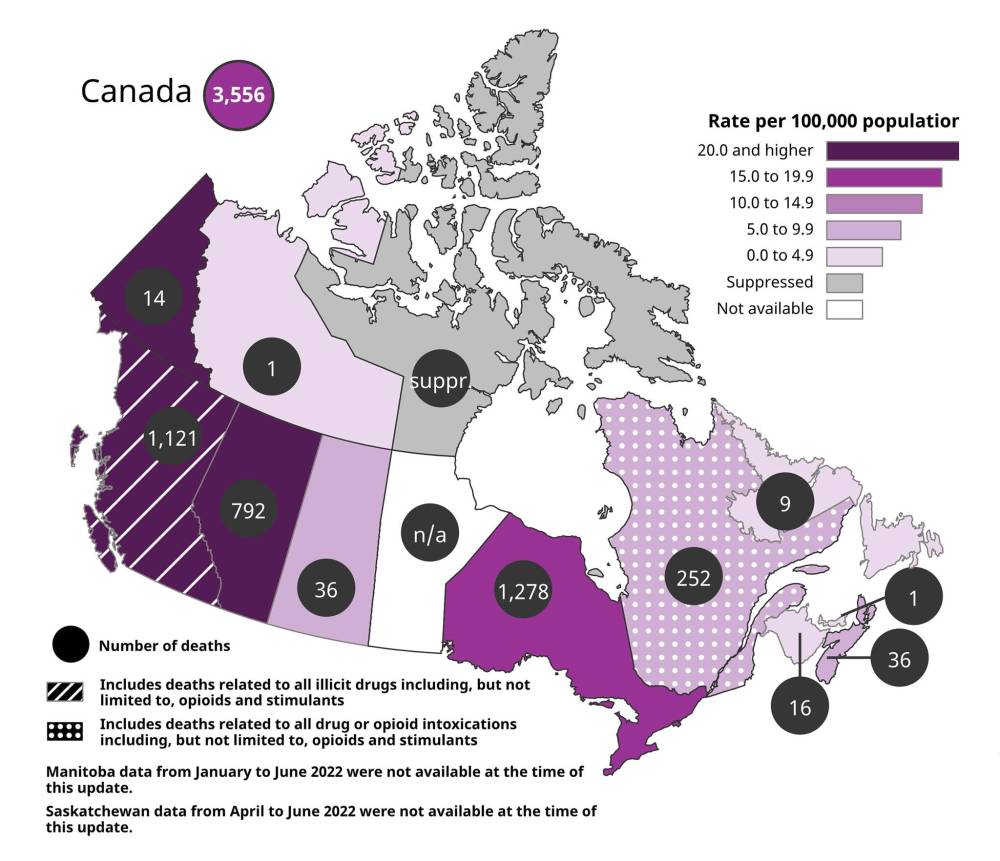Manitoba alone in not submitting overdose data to federal body
Read this article for free:
or
Already have an account? Log in here »
To continue reading, please subscribe:
Monthly Digital Subscription
$0 for the first 4 weeks*
- Enjoy unlimited reading on winnipegfreepress.com
- Read the E-Edition, our digital replica newspaper
- Access News Break, our award-winning app
- Play interactive puzzles
*No charge for 4 weeks then price increases to the regular rate of $19.00 plus GST every four weeks. Offer available to new and qualified returning subscribers only. Cancel any time.
Monthly Digital Subscription
$4.75/week*
- Enjoy unlimited reading on winnipegfreepress.com
- Read the E-Edition, our digital replica newspaper
- Access News Break, our award-winning app
- Play interactive puzzles
*Billed as $19 plus GST every four weeks. Cancel any time.
To continue reading, please subscribe:
Add Free Press access to your Brandon Sun subscription for only an additional
$1 for the first 4 weeks*
*Your next subscription payment will increase by $1.00 and you will be charged $16.99 plus GST for four weeks. After four weeks, your payment will increase to $23.99 plus GST every four weeks.
Read unlimited articles for free today:
or
Already have an account? Log in here »
Hey there, time traveller!
This article was published 21/12/2022 (1089 days ago), so information in it may no longer be current.
Amid a toxic drug crisis killing thousands of Canadians each year, Manitoba was the only province or territory to not share its latest data on overdoses to a federal body examining the issue.
The province says it was due to a lag in reporting — though the Office of the Chief Medical Examiner denies that’s the case — and it “chooses” not to share preliminary data.
Meanwhile, advocates for harm reduction say Manitoba is missing key opportunities to stop drug deaths if it is falling behind in tracking them and publishing data.
The Public Health Agency of Canada report, released earlier this month, marks nationwide trends and regional breakdowns based on the most recent available data on overdoses and deaths involving opioids and/or stimulants from 2016 to mid-2022 from each province and territory.
Number and rates (per 100,000 population) of total apparent opioid toxicity deaths by province and territory in 2022 (Jan to Jun). (Government of Canada)
Manitoba was the only province that didn’t provide 2022 data.
“The data for 2022 are not yet available due to a lag in reports being finalized at the Office of the Chief Medical Examiner,” reads a Dec. 15 statement from a provincial spokesperson.
“Final toxicology results take three to six months to complete, which can delay the medical examiner reports. As a result, these data are not yet available for… analysis nor submission to PHAC.”
Follow-up questions were directed to the medical examiner’s office, which suggested the timeline is standard.
“To be clear, there is no ‘lag’ in toxicology reports being received,” said OCME director Kathryn Braun. “Toxicology reports are usually back within three months, in some circumstances, they are longer, which is why our data is preliminary.
“The preliminary numbers are very close to final numbers, but not exact.”
Braun noted the province’s chief medical examiner “reviews the data monthly and reports on the preliminary numbers. The reason that PHAC does not have it is because our numbers are not finalized.”
However, PHAC states in the report it accepts preliminary data and recognizes it is subject to change, pending the outcome of investigations by coroners and medical examiners.
On Wednesday, the province clarified its position, saying: “Staff advise that while they have some data, Manitoba chooses only to submit ‘complete’ data to PHAC. Other provinces may submit data as they have it, and update it as additional data comes in.”
Shohan Illsley, executive director of the Manitoba Harm Reduction Network, questions why other provinces would share data but Manitoba wouldn’t.
Illsley said to access federal funds, harm reduction groups rely on data that highlights the extent of the drug crisis locally.
“On a national level, it doesn’t put Manitoba on the radar for needing a co-ordinated response,” Illsley said. “It looks like Manitoba is OK then? I don’t know.”
More than 400 Manitobans died of drug overdoses in 2021 — a number expected to climb this year.
“On a national level, it doesn’t put Manitoba on the radar for needing a co-ordinated response.”–Shohan Illsley
Preliminary data shared with the Free Press by the OCME in early December shows there were 246 overdose deaths in the province between January and July, including 160 opioid cases.
According to the PHAC report, there were total of 32,632 apparent opioid toxicity deaths between January 2016 and June 2022 across Canada, with 3,556 cases during the first six months of this year.
“This is approximately 20 deaths per day,” the report states.
In the years between 2016 and 2018, there was an average of eight to 12 deaths per day.
Manitoba Health Coalition provincial director Thomas Linner said if there is a problem, or a lag, in confirming or sharing overdose data, the province should prioritize addressing it.
Thomas Linner, provincial director of Manitoba Health Coalition. (Jessica Lee / Winnipeg Free Press files) 
“To simply state there is a backlog, while doing nothing to clear that backlog, is an abdication of responsibility at best, and an intentional tactic to withhold information at worst,” Linner said.
“They have the responsibility, in a public health emergency, to ensure that the resources are put in place to make that data available in a timely manner.”
Asked what the province was doing to address the issue, a spokesperson said: “Manitoba Health and the Office of the Chief Medical Examiner will continue to work toward the timeliest reporting possible.”
Linner said information held by the province could potentially shed light on trends in overdoses, which, if caught, could save lives. That alone should be “worth it” to go to the effort to improve reporting, he added.
“To simply state there is a backlog, while doing nothing to clear that backlog, is an abdication of responsibility at best, and an intentional tactic to withhold information at worst.”–Thomas Linner
He noted the Tory government is under fire for what critics say is an “ideological” opposition to supervised drug consumption sites, which have been credited for saving lives.
It also looks bad the province isn’t providing the data amid a recent controversy where the community wellness minister was caught for misleading the public on visiting supervised consumption sites in Vancouver when she did not, Linner said.
A spokesperson said the province issued a release with more up-to-date information about Manitoba’s overdose crisis Dec. 16. The report, dated Nov. 25, noted fentanyl, methamphetamine and cocaine were the most common causes of overdose deaths in Manitoba in 2021.
Linner said while he was glad to see more information shared publicly, he questioned why it only came after the Manitoba Health Coalition criticized the government for “hiding” information from PHAC.
The province should share more detailed information about overdose deaths, including locations and demographics, he said. “This is information Manitobans need to know.”
katrina.clarke@freepress.mb.ca

Katrina Clarke is an investigative reporter with the Winnipeg Free Press.
Our newsroom depends on a growing audience of readers to power our journalism. If you are not a paid reader, please consider becoming a subscriber.
Our newsroom depends on its audience of readers to power our journalism. Thank you for your support.







